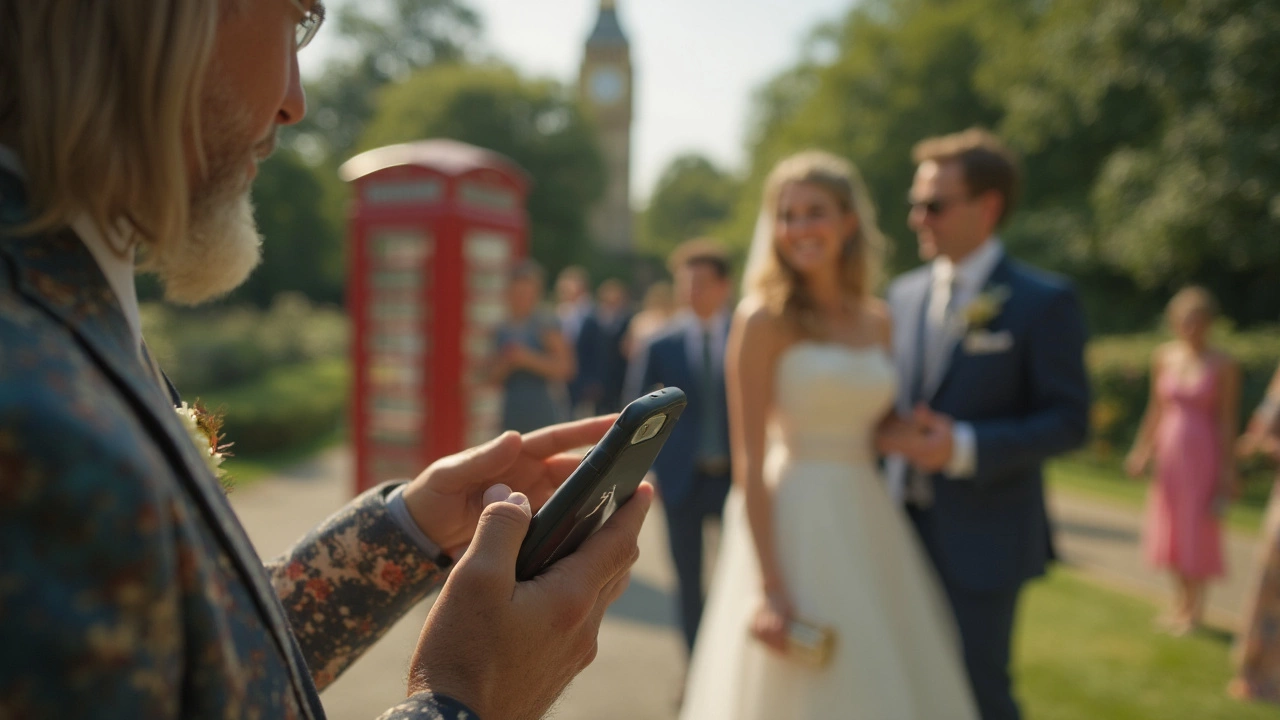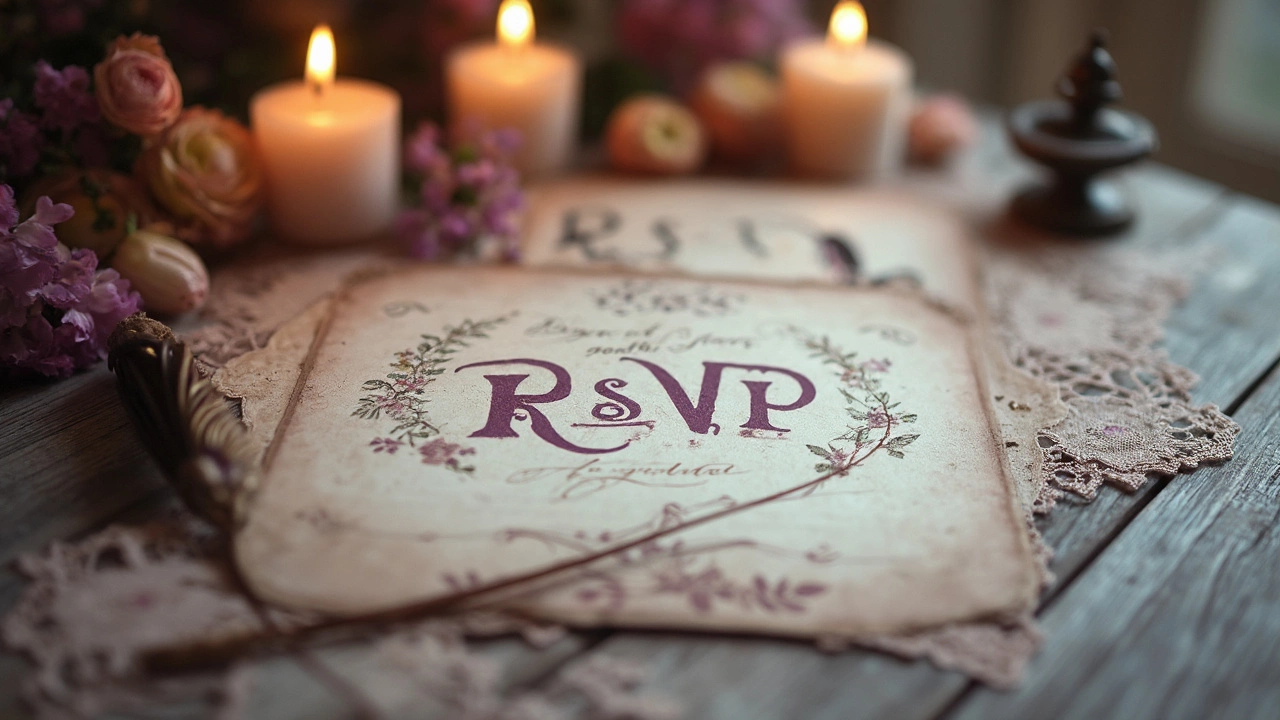You know that tiny acronym RSVP on wedding invitations that everyone seems to recognize but not fully understand? It stands for the French phrase 'Répondez s'il vous plaît,' which translates to 'Please respond.' But what's up with the 'D'? Well, here's the tidbit: in the French phrase, there's no 'D.' It's a mind-boggler, right? The 'D' is a phantom, a remnant of us Brits and Americans anglicizing a French term. No need for 'D' in the original, but it's snuck its way into our minds.
Now, you might wonder why RSVP plastered itself on every wedding invite. It's all about planning, my friend. Imagine trying to figure out how much cake or how many seats you'll need without knowing your guest count. That's a disaster waiting to happen. With RSVP, guests are nudged to respond in time, making things less chaotic for the couple-to-be. And let's be real, wedding planning has enough chaos without the mystery guest count.
- The Mysterious 'D' in RSVP
- Why RSVP Matters in Weddings
- Tips for Making Your RSVP Clear
- Common RSVP Mistakes to Avoid
The Mysterious 'D' in RSVP
So, what’s the scoop with the 'D' in RSVP, anyway? It's actually a classic case of linguistic evolution. The abbreviation RSVP is derived from the French phrase 'Répondez s'il vous plaît,' which directly translates to 'Please respond.' Now, if you went ahead and Googled it before reading this, good on you, but you'll find there is no 'D' in that French phrase. The 'D' is something we English speakers added to fit our flow. It's what you call an interesting mutation through everyday use.
Long ago, when English speakers started using RSVP from French, the phrase just morphed a bit to include an extra consonant. It seems those early correspondences paved the way for the current mix-up. It's an excellent little nugget of trivia to toss around at your next social event—or if you're unashamedly nerdy like me, at a dinner party.
Did you know that RSVP starts popping up in correspondence as early as the 18th century? Yep, folks were using it as a courteous way to emphasize the importance of letting them know if you were attending their gatherings. Back then, party planning relied heavily on responses, much like today. It’s like saying, 'Hey, I need to plan this properly, so tell me if you're coming.'
The 'D' might have snuck in over time, but today, having RSVP on a wedding invitation is a universal call for guests to confirm attendance—sans any linguistic drama. And while the 'D' mocks us with its nonsensical presence, the idea remains crystal clear: Please respond!
Why RSVP Matters in Weddings
In the world of wedding planning, an RSVP isn't just a formality. It's like the secret sauce that keeps everything running smoothly. Imagine organizing a dinner party for ten and having only five show up. Now, scale that up to dozens or even hundreds, and you get the picture. Knowing who’s coming helps the couple figure out seating, catering, and even the size of the dance floor.
Catering is one of the biggest wedding expenses, and knowing your guest count allows you to budget appropriately. No couple wants to pay for empty chairs or extra plates of salmon that go uneaten. Plus, venues often need numbers finalized weeks in advance. Without solid RSVPs, you're left scrambling or overpaying, which both sound like nightmares.
But wait, there's more! It’s not just about food. Think about party favors, wedding programs, and seating charts, too. Every little thing hinges on that magic number. Without it, there’s a real risk of either running short or ending up with a bunch of keepsakes that won’t see another day.
And here's a fun little detail: a reliable RSVP system can cut down on last-minute surprises. No one wants surprise plus-ones showing up or, worse, discovering a dearly missed family member in the gallery of absent guests.
All these reasons make RSVPs crucial in wedding planning. For you soulmates tying the knot, strong responses help keep everything on track, allowing you to actually enjoy your day without sweating the small stuff. And for guests, it's a simple way to show love to the couple. It's amazing how a little card or click can make such a big difference!

Tips for Making Your RSVP Clear
Alright, let's get down to it. Making sure your RSVP is clear on your wedding invitation is crucial. This tiny detail can make a big difference. No one wants a planning fiasco, right? So, here’s how to avoid confusion and ensure everyone knows what’s what.
First off, set a deadline. This might sound obvious, but I've seen heaps of invites without a clear date for responses. How are guests supposed to know when to let you know if they're coming or not? Be specific: 'Please RSVP by April 30th.' It gives your guests a firm date to aim for and helps you finalize details faster.
Next, make it crystal clear how you want to receive responses. Are you going old-school with RSVP cards, or are you more into the tech-savvy approach of emails and wedding websites? Either way, lay it out in the simplest terms possible. Something like, 'Please respond via our website or email,' works a charm.
Here's a cool idea: add a little FAQ section or note. You won't believe how many questions people have about venues, timings, or meal choices. A brief note like 'Check our wedding website for more details' can save you a ton of phone calls.
To make things even more straightforward, consider including an RSVP option directly on your wedding website. Many platforms have built-in features that let guests respond with a click. It's streamlined and efficient!
- Make sure your wedding invitations include options for dietary preferences. This isn’t just thoughtful; it's a must with today's diverse dietary needs.
- Remind guests gently of the importance of timely responses with a friendly nudge like, 'Your response helps us celebrate with you!' It adds a personal touch, too.
And finally, follow up with non-responders after the deadline. Life gets busy, and sometimes invitations get lost in the shuffle. A quick call or message can sort out those last-minute responses.
Common RSVP Mistakes to Avoid
Getting your RSVPs right might seem straightforward, but you'd be surprised at how many hiccups can pop up. First off, let's talk about RSVP meaning. It's not just a suggestion; it's a polite but firm request to let your hosts know if you'll make it to their special day. Ignoring it is like not answering the doorbell when someone's expectantly waiting on the porch.
One common mistake is mixing up dates. Double-check the wedding invitations and compare calendars to avoid any mishaps with last-minute responses. An RSVP deadline isn't just for decoration; it helps couples plan everything from seating to catering. Replying after the deadline might seem harmless, but it can throw the whole thing off balance.
Next up is the 'Plus One' puzzle. Folks sometimes assume they're automatically allowed a plus one, but that's not always the case. If your invitation doesn't explicitly list a guest, it's best to ask rather than just show up with a tagalong. On the flip side, if you receive a plus one and plan to fly solo or bring someone else, communicate that clearly in your response.
Ever heard of winging it with dietary needs? That's a biggie. Couples try hard to cater to everyone's dietary preferences, so inform them of any allergies or preferences when replying. Last-minute surprise requests can lead to awkward dinners and hungry guests.
Finally, let's not forget virtual RSVPs. In this digital age, many couples prefer online responses. Make sure to follow the instructions given, whether it's an online form or a traditional card. The method matters because it directly affects how easily the couple can manage their guest list.
Keeping these points in mind simplifies the invitation process, making the planning smoother and ensuring you don’t accidentally step on any toes.

